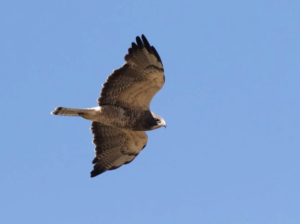In late October 2014, bad weather in western Panama grounded a kettle of raptors making their annual journey south for the season. The birds of prey don’t fly in bad weather—and October is the very end of Panama’s rainy season.
“We kept seeing big reports coming in from Bocas Del Toro, but nothing was showing up in Panama City,” says Jenn Sinasac, a biologist, naturalist guide and operations manager at the ecotourism company White Hawk Birding in Panama. Typically, it takes about a day for the birds to get to Panama City from the west. But, Sinasac adds, “nothing was coming through for about four or five days.”
Suddenly, on November 2, the Mississippi kites, broad-winged hawks, Swainson’s hawks and turkey vultures came in droves, smashing the previous record for number of migrating raptors counted in a single day.
“It was spectacular,” Sinasac says, her voice cracking from the beauty of it. “The skies were full of raptors over Panama City from first thing in the morning until dusk.”
During the migration season, which typically begins in late August and runs through November, it is typical for about two to three million birds of prey to fly through Panama, in what amounts to the world’s third-largest raptor migration. (The second largest is in Eilat, Israel, and the first in Veracruz, Mexico.) The raptors cover hundreds to thousands of miles on their journey from North America to South America. The species that follow this particular migratory path can be seen as far north as the Arctic and as far south as Argentina and Chile. The distance covered changes based on the species and food sources. Swainson’s hawks, for example, travel 14,000 miles from the Canadian Arctic to southern Argentina. Broad-winged hawks travel 4,350 miles on average, from southern Canada to Bolivia.

